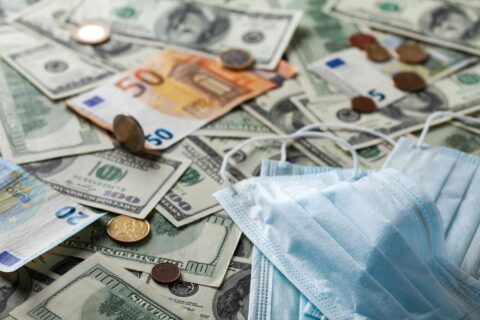The Charisma Index helps brands understand their reputation based on the issues that matter most to consumers. Providing insights on six dimensions, ethical and directional, that are crucial to brand success in the modern age, the Charisma Index is unique in determining brands’ resilience and in defining leadership strategies.
The Charisma Index undertook research, with Respondi, to provide brands with a sense of consumer sentiment in these unprecedented times and to understand the potential implications and legacy of how brands are seen to behave in lockdown[i]. This recent study – conducted among UK consumers – suggests that brand’s behaviour during the COVID-19 pandemic will have long-term effects on long-term brand reputation:
- 81% think that how brands behave now, will matter to people when the COVID-19 pandemic finishes
- Furthermore, 48% say this will be a long-term legacy
- ¾ believe that how brands behave now will affect whether they personally buy them in the future
- 56% say they will actively choose or switch to brands they’ve seen behaving well during the COVID-19 pandemic
- Conversely, 48% say they will avoid brands they’ve witnessed behaving badly or who hadn’t done their bit during lockdown
Clearly ‘good’ behaviour from brands during the COVID-19 pandemic potentially means long- term reputational rewards. Conversely, ‘bad’ behaviour can have the opposite effect.
But what constitutes ‘good’ behaviour from brands?
Good behaviour is summed up as ‘thinking of others’ and ‘putting the common good first’. Brand behaviours praised by consumers include:
- Protecting their customers (mainly by enabling social distancing and implementing safety measures, hand sanitising etc.)
- Adapting and devising new ways to deliver good service (mainly through upping delivery services); and helping the vulnerable (with special shopping slots and delivery priority etc.)
- 22% praised brands for simply managing to keep going, keep open and carry on regardless
Juliet Strachan, consumer research specialist at The Charisma Index commented:
“Some brands were noted for just having closed when asked (or before!) and just keeping quiet, whilst looking after employees.Brands don’t necessarily have to be at the forefront of fighting COVID-19 to be seen as hero brands, they just have to get on with it and do their best.”
Finding ways to help the NHS was also seen as good brand behaviour. This could be via special deals and discounts for NHS workers, manufacturing PPE or sanitisers, or actively directing resources to research.
Brand behaviours have clearly registered with consumers: 88% of consumers can spontaneously think of at least one brand or organisation that’s done their part to positively help and contribute towards fighting COVID-19 and 85% could relay multiple ways in which these brands have helped.
The brands named spontaneously are ‘hero brands’. Those who’ve behaved with integrity and haven’t exploited the crisis. These brands will see the reputational rewards when the new normal finally arrives.
Who are the hero brands?
The biggest hero sector are supermarkets, who have kept the nation fed while keeping people safe. 66% of consumers mentioned a supermarket brand or the sector as a whole: (% shown are proportion of consumers mentioning each brand): Tesco (20%), Sainsbury’s (12%), Asda (9%), Morrisons (6%), Aldi (6%) and Co-op (4%) were the highest individually mentioned.
However, supermarket brands have also been criticised for not acting quickly enough to put in safety and distancing systems and for delivery systems that ‘over catered’ to the vulnerable, elderly or NHS, at loyal customer’s expense. Whilst hardly a noble sentiment, it’s understandable that during tough times poor service will frustrate consumers.
Outside of supermarket brands several other hero brands exist. Amazon (10%) and delivery brands in general; Boots; the Post Office, and the restaurant and takeaway sector were all highly praised. As of course were the NHS (13%) and care sector (16%). Not everyone thinks of the NHS as ‘a brand’, but when asked spontaneously, enough want to mention it anyway when it comes to behaving well!
What about the bad behaviour?
Normally, Brits are more reticent about apportioning blame or criticism in surveys. We tend to shy away from naming offenders unless they have really upset us! However, in this study, 69% can spontaneously think of at least one brand they think hasn’t behaved well. Given nearly half of UK consumers claim they’d avoid buying brands who hadn’t acted appropriately during COVID-19, this could seriously impact offender’s business.
Which brands are seen as the biggest offenders?
The brands singled out for most criticism were Wetherspoons, Virgin (majority referring to the Airline) and Sports Direct. 20% of UK consumers spontaneously mentioned at least one of these three brands by name. These brands account for 30% of all brands criticised.
Wetherspoons and Sports Direct were singled out as putting their own interests first, regardless of staff or customers. They were specifically criticised for, not closing outlets fast enough, trying to stay open as ‘essential’, putting particularly staff at risk; and treating staff badly, making people redundant, not protecting jobs (despite the government’s financial help and furlough scheme) and putting their business before safety and welfare.
Airlines have been highly criticised. However, this was predominantly Virgin Atlantic for trying to lobby for Government bailouts when other businesses were felt to need the help more; and Ryan Air were criticised for continuing to fly with packed planes. Most of the negative sentiment was levied directly at the famously rich brand owners: Richard Branson, Tim Martin and Victoria Beckham. These brand owners were seen as money grabbing and selfish in their actions.
In essence, brands are supposed to serve, provide good service and products and to contribute to the economy. Almost 7 in 10 can think of brands that are seen to have failed in this respect, predominantly due to three main areas:
- Not doing enough to protect their employee’s jobs
- Lobbying for bailouts!
- Trying to exploit the crisis for their own gain – putting profit before people
‘Such behaviours will be remembered when consumer choice can be exercised more freely’ says Strachan. And there’ll be consequences. Of course, not all consumers who say they will buy good brands and avoid bad, will do so. However, the magnitude of good and bad sentiment is such, that the lasting impact will likely be substantial. If just 1% of your customers defect, what will that cost your bottom line?
Conversely, brands perceived to have acted with integrity, demonstrated generosity, put people first (staff and customers), have acted like good corporate citizens and played their part, will reap the benefits.
But most brands – carrying on regardless to serve the nation (and in doing so protect jobs and the economy) will also have much greater resilience when the crisis is over.
It’s worth remembering, nobody saw COVID-19 coming. No brand strategy or direction documents had COVID-19 and worldwide lockdown in their what-if scenarios and planning. So, brands (owners and teams) are now acting on their instincts and showing their true colours. How will your brand emerge from this and how will this effect its reputation, post lockdown?
For more information on the study please contact:
Juliet Strachan: juliet.strachan@thecharismaindex.com
Tel: +44(0) 7768 998491
Keith Wells: keith.wells@thecharismaindex.com
Or go to: www.thecharismaindex.com
[i] Fieldwork 14th to 18th May 2020
Sample UK adults, Nat Rep by age, gender and UK region
Sample size: 1079 UK adults 18+


